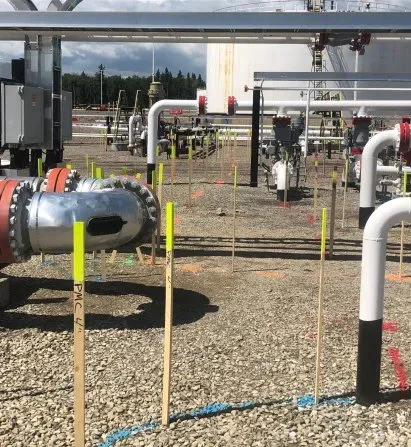How To Hire an Expert Line Locator
Line locating service companies are not governed by specific guidelines, regulations, standards, and best practices
How Can You Tell an Expert Service from a Dud?
The lack of standards in the line locating industry means individual companies can set their own standards.
Service providers may or may not have well-trained employees or a well-developed system for delivering consistent, reliable results.
That can make hiring a locator a tricky undertaking.
Dig in for an explanation of what to look for when hiring an expert line locator service.
1. Excellent Credentials
An expert locator couples Ground Disturbance Level 2 training with decades of field experience. They have a firm grasp of the ground disturbance rules and regulations and, most importantly, how they apply to your project.
Credible locating service companies take their employees through a detailed in-house training program that covers every aspect of locating buried utilities. Besides the training, these companies test employee ability in numerous locating challenges.
The testing criteria are comprehensive and include supervised on-site audits, strict quality control, and written tests. On completion, the line locators can interpret previous as-builts, survey diagrams, rights-of-way (ROW), and survey diagrams. They can cross-reference Aba Data, Accumap, and other information that the locate company provides.
Be wary of a locator who presents a standard certification ticket as professional credentials. It takes more than a 1-day course to gain the skills and expertise necessary to locate buried utilities on a site.
2. A Methodical Approach
Professional line locators understand the dangers of going in blind. They're fully aware of the legal and financial ramifications of hitting buried utilities.
They're methodical in their approach. Before starting the project, a credible LSP (locating service provider) compiles all available information on the buried infrastructure. They require:
Public locates for the area
Landowner's utility records
Access to the above-ground utility infrastructure
Site assistance from the property owner
Furnishing the locator with information and access is critical to a successful outcome. It keeps them from flying blind and lowers the likelihood of missing a buried facility.
3. Excellent Understanding of the Outcomes
A professional line locator takes time to understand your needs and what the job entails. They'll start by reviewing the record of buried facilities on the property to identify the path and connection points. That informs the choice of detection method to use.
Proper detection is crucial because it helps the service provider deliver credible results. That includes adding more stakes to mark side bends, crossings, and proximity parallels.
4. Exceptional Staking Expertise
Besides identifying the buried facility, a reliable line locator makes it easy to distinguish them. They will label and colour code each buried utility with the universally accepted codes:
Red - electrical, power lines, and conduit
Green - sewer and drain lines
Yellow - gas, steam, oil, petroleum
Blue - potable water
Purple - irrigation, reclaimed water
Orange - TV, communication, alarm, or signal
White - proposed excavation
As well as marking and colour-coding each line uniquely, expert services provide additional details. That includes the size of the utility, substance, and the company that owns it.
Precise utility location guarantees safe facilities exposure. It also protects your brand reputation. Striking one line too many triggers an AER audit, limiting your autonomy. The AER may limit your ability to utilize your staff to conduct ground disturbance practices, including GD permitting, line crossing inspections or self-audits.
5. Verification of Available Data
Hiring an expert line locator on a marked site might seem like a wasteful duplication of service, but it's not. Sometimes the available data may be out-of-date and the drawings inaccurate.
If a line locator isn't afforded all the necessary support, they could miss one or more utilities on the site and deliver an inaccurate report. Professionals document any limitations on the locate report. Cheap services may omit the limitations from their reports.
Credible line locators have the expertise, experience, and technology to deliver accurate and comprehensive locate reports.
6. Actionable Deliverables
An expert line locator service delivers a detailed diagram of the site, detailing the locates within it. The locate report includes:
all licensed, buried utilities within 30 meters of your ground disturbance area
ownership, size and substance, and if possible, the status of each utility
pipeline ownership
Cable designation - ground cable, buried cable, communication cable, cathodic cable, etc
Well-documented limitations of the report and any difficulties or signal interferences encountered during the exercise
After completing the report, a reliable line locator takes the client for a walk-through. They explain the size of the search area, the locates, and discrepancies in the current mapping information. They also detail any problems they encountered during the process.
Great Locators Get It Done Right the First Time
Expert line locators will save you money, not because they're cutting corners, but because they know what they're doing.
The value of an accurate locate can't be overstated. An expert line locator service safeguards your property and possibly even your life.
TCB Line Locating uses proven and proprietary methods to map and mark buried facilities. You can count on our extensive experience to provide you with top-notch service.

